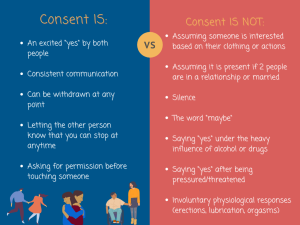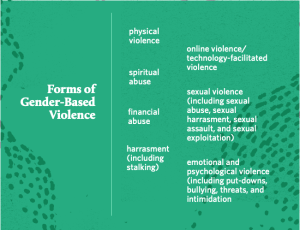Chapter 6: Personal Considerations
52 Sexual Violence and Safety
Although Cambrian’s staff and faculty will continuously strive to make your campus a safe, comfortable, and secure space, instances of gender-based violence and other unwanted sexual experiences are, unfortunately, realities for some students. It’s also important to keep in mind that instances of sexual violence are usually perpetrated by somebody close to us, which may come across as surprising! A great first step to avoiding these harmful situations is understanding how to keep yourself and your peers as safe and protected as possible.
Information and details about Cambrian’s commitments to survivors of sexual assault and resources can be found here.
Ontario’s definition of sexual violence is “any sexual act or act targeting a person’s sexuality, gender identity or gender expression, whether the act is physical or psychological in nature, that is committed, threatened or attempted against a person without the person’s Consent, and includes things such as: Sexual Violence; Sexual Harassment; stalking; indecent exposure; voyeurism; and, sexual exploitation.”
Sexual violence can take on many forms:
Staying Safe
- Be aware of your surroundings. When you’re navigating campus or its surrounding areas, stay alert of who and/or what is around you. If you’re walking alone, only use headphones in one ear and don’t be glued to your phone.
- Be wary about posting your location. Many social media apps such as Snapchat and FaceBook automatically update and publicly share your location with your friends. Disabling this feature is always a safer option.
Social Settings
- Only go to parties with people that you know and trust. Make a plan to stick together and leave together. If these plans change, communicate with your whole group to ensure that you all know where each person is.
- If you have a drink, don’t leave it unattended. It’s best to decline drinks offered to you by strangers unless you watched them being made or poured.
- You’re allowed to lie. If you and/or a friend are in an uncomfortable or potentially frightening/dangerous situation, it’s okay to make up an excuse to leave that environment as quickly as possible. Here are some example excuses you can use to avoid an unwanted situation or interaction:
- You/your friend don’t feel well
- You’re late for something and need to hurry
- You need to take/make an important phone call
- In these situations, being a positive bystander is also essential.
This can look like:
-
- Breaking up situations in which one or more people appear uncomfortable
- Checking in with a victim of sexual violence and offering your support
- If it’s safe, calmly calling out unwanted behaviour
After a Sexually Violent Encounter
- In the immediate aftermath of an unwanted sexual encounter, it’s important to relocate to a safe and secure place that will ideally bring a sense of normalcy and stability.
- If you are on or off-campus, call or go to a trusted individual or friend; or
- If you are on the Barrydowne campus, you can call Campus Security Services at 705-566-8101, ext. 7911 – they are available 24 hours a day, 7 days a week; or
- If you are elsewhere, you can call Emergency Services at 911
- Get medical attention as soon as possible.
- Go to your nearest Hospital Emergency Department.
- For the Sudbury area, go to Health Sciences North Emergency Department triage (41 Ramsey Lake Rd), and ask to have the Violence Intervention and Protection Program (VIPP) Nurse on-call paged. The VIPP nurse will respond within 30-45 minutes to meet with you to discuss your treatment and support. The hospital is open 24 hours a day, 7 days a week. Assessment is confidential.
- In Espanola, go to the Emergency Department of the Espanola Regional Hospital and Health Centre located at 825 McKinnon Dr. The hospital is open 24 hours a day, 7 days a week.
- In Little Current, go to the Emergency Department of the Manitoulin Health Centre located at 11 Meredith Street. The Centre is open 24 hours a day, 7 days a week.
- You can also call the VIPP unit directly at 705-675-4743, Monday to Friday, 8:00 a.m. to 10:00 p.m. or contact them at the following email address: dvsatprogram@hsnsudbury.ca
- Go to your nearest Hospital Emergency Department.
- Gather as much information about the occurrence as possible. If possible or applicable, it’s always helpful to compile evidence of communication, details about the perpetrator’s identity and appearance, and any other relevant pieces of information about the situation.
- Consider Reporting
- If you want to report, you have several options that you can proceed with as soon as you are ready. The following areas can help you file reports:
- Manager, Equity, Human Rights and Accessibility at 705-566-8101, ext. 7235, Mondays to Fridays from 8:30 am to 4:30 pm, or
- Campus Security Services 705-566-8101, ext. 7298 after 4:30 p.m. on weekdays or anytime on weekends, or
- Residence Service Desk and ask for the on-call Manager at 705-566-8101, ext. 7583, or
- Students’ Administrative Council (SAC) at 705-566-8101, 7729, or
- Local Police Services:
- In Sudbury, call 705-675-9171
- In Espanola, call 705-869-3251
- In Little Current, call 1-888-310-1122
- We strongly encourage you to disclose and report incidents of sexual violence; however, it is entirely up to you if you choose to do so. We recognize that this may be emotionally difficult and you may want to reach out to the resources available to you. We also encourage you to seek out support, including College and Community Services.
- If you want to report, you have several options that you can proceed with as soon as you are ready. The following areas can help you file reports:
- Keep in mind that what happened, whether it was to you or someone you know, was not your fault.
Video: Understanding Consent- Tea Consent
Watch the video “Tea Consent” [2:49] to learn more about consent.

How do I ask for consent?
- Some people are worried that talking about or getting consent will be awkward or that it will “ruin the mood,” which is far from true.
- If anything, the mood is much more positive when both partners feel safe and can freely communicate about what they want.
- Talk about what each partner is comfortable with before you are considering being physically intimate.
Red Flags
- They pressure or guilt into doing things the other may not want to do.
- They make their partner feel like they “owe” them — because they’re dating, or they gave them a gift, etc.
- They react negatively (with sadness, anger or resentment) if their partner says “no” to something, or doesn’t immediately consent.
- They ignore their partner’s wishes and don’t pay attention to nonverbal cues that could show they’re not consenting (ex: pulling/pushing away)
Consent is key to a healthy relationship
In a healthy relationship, it’s important to discuss and respect each other’s boundaries regularly. It’s not okay to assume that once someone consents to an activity, it means they are consenting to it anytime in the future as well. Whether it’s the first time or the hundredth time, a hookup, a committed relationship or even marriage, nobody is ever obligated to consent to something, even if they’ve done it in the past. A person can decide to stop an activity at any time, even if they agreed to it earlier. Above all, everyone has a right to their own body and to feel comfortable with how they use it. It’s also important to remember that gaining consent does not just apply to sexual encounters. Everyone has the right to decide whether they want to engage in a range of emotional, intellectual, and physical activities.
Handling Rejection
Romantic, platonic, and/or sexual relationships may come and go throughout your post-secondary years. The end of a meaningful relationship can be quite difficult to recover from, especially if it involved being rejected by somebody you admire, value, and trust. Here are some ways to navigate and handle these emotions in a healthy way:
- Understand that being rejected by one person doesn’t mean that you aren’t worthy of or good enough for meaningful relationships.
- Respect the person’s decision to end the relationship by valuing their honesty and transparency.
- Take a break from seeking new relationships and attachments to personally heal and reflect on the rejection.
- Avoid suppressing feelings of sadness and disappointment. Allow yourself to express these very normal emotions.
- Surround yourself with a healthy support system of peers.
- Take care of and love yourself for who you are, even if someone else couldn’t!


